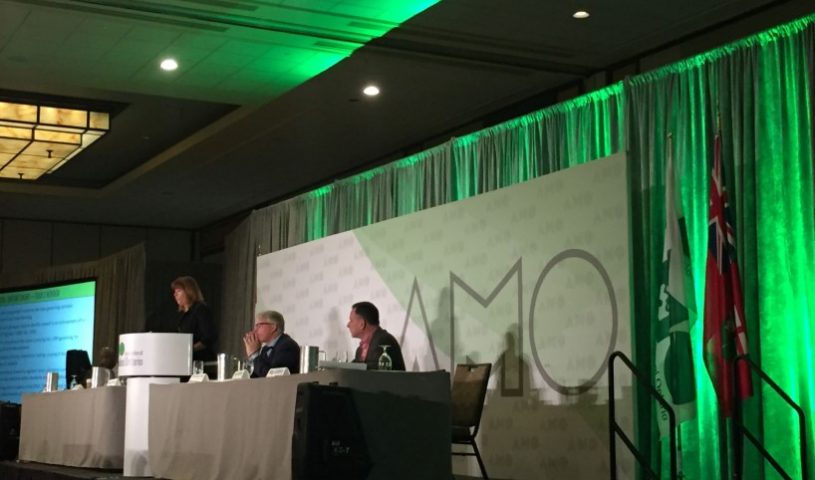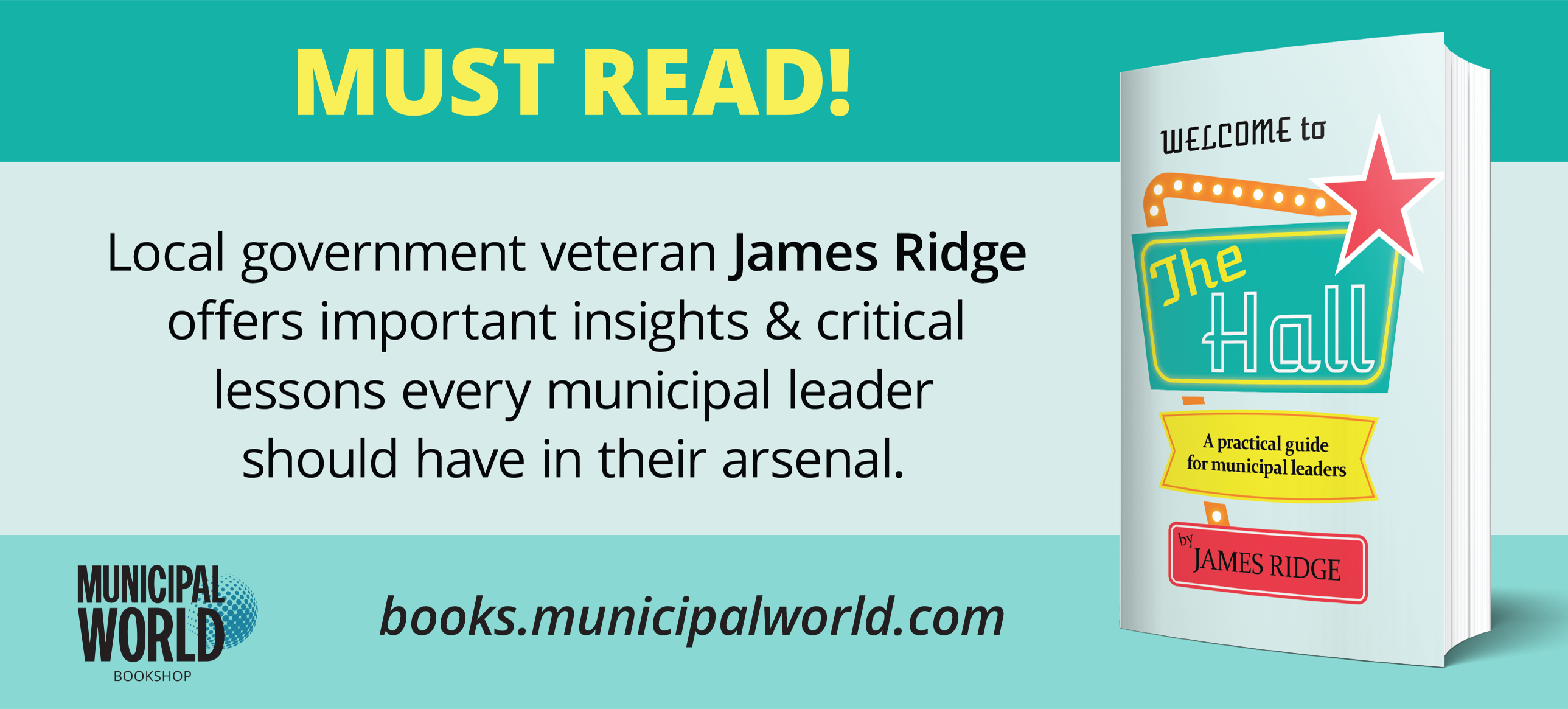Municipal World Report: 2018 AMO Annual Conference

Municipal leaders are concerned for the future – not just for their own community, but also for their country as a whole. At the 2018 Association of Municipalities of Ontario (AMO) Annual Conference in Ottawa, Ontario, leaders from across the country gathered to discuss innovative technology and emerging best practices that would allow them to put their best foot forward in fields like technology and communications, finance and fair trade, and politics and legislation.
Municipal Innovation – Planning for the Future
“We are on the brink of a revolution,” explains keynote speaker and strategist Shawn Kanungo. The reason: technology and innovation. The internet era has been incredibly disruptive – whether through new ways of communicating (for good and for bad) or with big challenges around issues of privacy and security – but, it’s also full of hope. It is an opportunity to bring together the best of human knowledge, to build something truly great. And, the results that come from that innovation will truly change the world.

Above: Shawn Kanungo, strategist and keynote speaker.
The revolution is around technology – and we’re already seeing the initial surge. While not every prediction will be perfect, certain things have already started to manifest: the sharing economy, “open talent economy,” and automation. These things are having a tangible effect on life beyond the technological sphere; issues related to universal basic income, ownership, new skills and behaviours developing as a result of the growth and availability of talent, and even the future of work are all questioned. (For example, Kanungo cites the interesting example of willrobotstakemyjob.com – a site that would have been thought to be science fiction even at the turn of the century.) How we prepare now is going to have huge ramifications. Wherever the next major development comes (and according to Kanungo, he’s hedging on voice technologies), municipal leaders have to be aware and prepared.
But what of municipalities? There is the belief that innovation is being killed in municipalities – largely because of nostalgia. People love the way things were done in the past. To shake out of that, it’s going to require a new generation of leaders, or for our current leaders to evolve and grow and truly embrace digital. It means being bold, and it’s especially hard because, as Kanungo suggests, “the most established organizations are the most vulnerable and unprepared for disruption.” And, experimenting and finding the best new ways to innovate is going to be the difference
“Municipalities are designed to operate well; [they] are not designed to experiment,” Kanungo added. That isn’t to say there isn’t a future for municipal innovation, it just means that we need bright, innovative leaders who are willing to try, doing small things with small teams and measuring the community impact. He adds that one key factor is to talk to residents and get to know them, since the best experiments are based in ethnographic research.
His combination of sharp ideas and prescient examples with wit and dynamism left the audience with plenty to think about – and the message of innovation is something that all leaders should consider.
Creating Fair International Trade Agreements with Municipal Governments
The reality of the world is that municipalities are buffeted by forces outside of their control, leading to things that they just need to deal with. Issues on the provincial, national, and international scale have real, tangible impacts on what happens in our communities – whether we like it or not. That said, being aware of the world around us, and what the issues mean on a practical level, is still vital.
For example, the issue of trade agreements is a hot topic in the news recently, but beyond the rhetoric around trade, there are some very practical issues for municipalities to consider. This was the topic of associate professor and CN-Paul Tellier chair for the University of Ottawa Patrick Leblond’s presentation – and it served as a solid foundation of background knowledge for municipal leaders.

Above: Patrick Leblond, associate professor and CN-Paul Tellier chair for the University of Ottawa.
In Ontario, most of the major partners with which we trade are governed by trade agreements (i.e., NAFTA, CETA, EFTA, and the pending CPTPP), so this is a critical issue. And, as Leblond noted, free trade is more akin to managed trade – if it was truly “free,” all trade agreements would only require one sheet of paper. But, the principles of non-discrimination, fairness, and the free flow of goods, services, data, and investment are still a foundation, no matter how complex the issues get.
So, what does this mean for municipalities? There are four key areas that Leblond addressed for local government (with the understanding that many agreements are subject to minimum thresholds before they apply):
1. Financial assistance – There is a prohibition on subsidies that are applied in a discriminatory fashion and are designed to give local or national companies an advantage.
2. Procurement – Depending on the trade agreement, there are varying rules around whether municipal procurement is subject to these treaties. For example, CETA was negotiated with a specific eye to sub-national governments. It is important to remember, though, that each agreement is different and that careful attention should be paid to the specifics of various key agreements.
3. Public-private partnerships – This is an area that can be challenging in regards to international trade. For example, key questions to ask include: Was there any discrimination in the process? Are subsidies being provided? Is this akin to procurement? Again, municipalities should pay attention to the specifics of each agreement when looking at this topic.
4. Regulations – Are certain rules discriminatory (e.g., data localization)? There are certain exceptions regarding government regulations; however, it is yet to be determined whether municipalities qualify under this exemption. Leblond points to this as a particularly complex area that has yet to be tested.
The reality is that big picture issues can impact what happens to local government. And, as in many cases, where issues can’t be controlled, they can at least be prepared for.
Perspectives and Opinions of Ontarians – an Inside Look on Key Municipal Issues
In what was one of the highlights of the 2018 AMO conference, pollster Nik Nanos took the stage to deliver an address on “Perspectives and Opinions of Ontarians,” AMO-sponsored research to understand public perceptions on key municipal issues, as well as the larger political landscape. His findings can help to form a key piece of understanding of our communities, and help to shape policy going forward.

Above: Nik Nanos; pollster, entrepreneur, public speaker, author.
The Political Climate
After a few comments on the state of the federal and provincial polls as they currently stand, Nanos presented a blunt assessment of the state of Canadians currently. In reality, it’s not particularly optimistic. Only 12 percent of Ontarians believe the next generation will have a higher standard of living than what we currently experience – a staggeringly low number. Compare that with 60 percent of Ontarians that believe the standard of living will be lower. At a very basic level, what can you tell your children about the future?
Economic anxiety also plays a different role: consider the sharing economy. Does it exist because of the preference of the youngest generation, or does it exist because there aren’t any better options? Do Millenials want to own “stuff” but just can’t afford it? Or, taken a step back, is the sharing economy something real, or is it just a symptom of the economic malaise and inequity? There’s growing research that suggests the latter.
The reality is that since the end of WWII, we have been conditioned to believe that if you did everything right, you would be able to get ahead in a middle class existence, whether that was a car, a home, or a vacation. Now, that identity is being challenged – and it’s having serious impacts on all three orders of government. It’s now much more common and palatable to run as the “anti-establishment” candidate – there are a number of examples where that’s been a great success as a candidate harnesses the anger and discontent of a large number of voters. As Nanos suggested, as a politician, the last thing you want is to be considered part of the establishment.
Another major consideration is the fact that there is something of a loose relationship developing with the truth. For all the jokes about “fake news,” there is a legitimate challenge here. Taking the case of Brexit research, when individuals were confronted with the proof that a statement was a lie, 47 percent continued to believe the lie, while only 17 percent believed the truth. It’s something that politicians need to grapple with. It also allows for the power of symbolism to come into play. Symbolic messaging, whether it’s “building a wall” or “buck a beer,” resonates with people – it’s a suggestion that politicians are going to try to have some positive tangible impact on voters’ lives. And, it’s a powerful political tool that candidates running in upcoming elections need to consider – regardless of the policies that one might choose to run on.
The Data – What are Ontarians saying?
Nanos’s polling covered a few broad areas: municipal services, taxation, and the upcoming municipal election. Select highlights from each category follow.
First, in what should be no surprise to anyone who is connected to local government, infrastructure is a top concern. Thirty-one percent of Ontarians polled view it as the top challenge facing municipalities (compared with politics/council, budget/financing, social services, construction/growth, and housing – each of which only received five-to-seven percent of responses). Likewise, issues like ensuring quality drinking water, hospital issues, and infrastructure and transit all received significant support as key municipal issues. Tied to this, respondents were asked: What should be cut if revenues do not grow? Not surprisingly, the largest response was: “No services should be cut,” but wages for municipal employees, social services, emergency services, recreational services, and infrastructure maintenance each received over five percent of responses. And finally, on the question of “What is the most valuable service provided by local government?” health care, public works/infrastructure, and safety/emergency services. (Interestingly, five percent of responses suggested that municipalities offered nothing of value – reflecting a certain subset of the populace that most municipal leaders have likely encountered before.)
On taxes, a bit of information that should surprise no one: most people either don’t know or are unsure of just how much of the entire tax pool municipalities receive. (Nearly three in 10 people believe municipalities get 20 percent or more of all the taxes collected.) And, once respondents realized the budget constraints municipalities are working with, a majority of people suggested that they believe municipalities should get more (60 percent). Interestingly, both the net score and the percentage of people who believe municipalities should get more are the lowest since at least 2014. Likewise, the majority of respondents are opposed to cutting services to freeze property taxes (although any candidate who suggests it would still receive some measure of support since the results are not overwhelming). On the other hand, respondents suggested there was a great deal of concern about adding more property tax. It is the local government dilemma in a nutshell.
On the matter of elections, there is definitely some good news and bad news. Only two thirds of respondents were even aware of the upcoming Ontario municipal election, and barely over half of Millenials. However, over 80 percent of respondents said that they intended to vote; polling has consistently shown that voter intention is much higher in this election cycle than last. Finally, when asked about important qualities for candidates, honesty/transparency ranked as most important, followed by caring about local issues.
In all, there is a significant amount of valuable data for local politicians and staff to digest in this report – some of it positive, some of it negative. For full survey responses, see the presentation on the AMO website: https://www.amo.on.ca/AMO-PDFs/Events/18/Presentations/20180820-Perspectives-and-Opinions-of-Ontarians-N.aspx.
Grappling with the Great Unknown – Questions about Marijuana Legalization
The 2018 AMO Conference closed with a rousing presentation on “The Great Unknown” – marijuana legalization. Without hyperbole, October 17, 2018, promises to be one of the most significant and (potentially) challenging days for all orders of government. The magnitude of changes is still becoming clear, and the ways in which municipalities need to prepare is a seemingly daunting list. The presentations had three key focuses: 1) Ontario provincial government priorities; 2) the regulatory and enforcement environment; and 3) important connected issues that municipalities need to think about as they contemplate local impacts in their communities. (Read Municipal World’s report on the discussion here.)

Above: Cannabis and Communities – The Here and Now panel: Nicole Stewart, Ontario Ministry of Finance; Renu Kulendran, Ontario Ministry of the Attorney General; David Mitchell, Ministry of Children, Community and Social Services; Chief Bryan Larkin, Waterloo Regional and Ontario Association of Chiefs of Police Past President; Joy Hulton, Regional Solicitor, The Regional Municipality of York; and Raymond Callery, Greater Napanee CAO.
Taking Lessons Home
During the conference, Municipal World took the time to engage with sector leaders and speakers at the conference – including Lynn Dollin, Raymond Callery, Michael Fenn, and Nic Nanos, to name just a few. Keep an eye on our Media Centre over the next couple of weeks as we continue to share more stories.
With other key sessions like digital transformation; building inclusive communities; modern treaty-making; climate change and cleaner, sustainable designs; emergency management; promoting active transportation and health – including investing in more resilient infrastructure – and much more, municipal leaders and delegates alike had much to learn. MW



